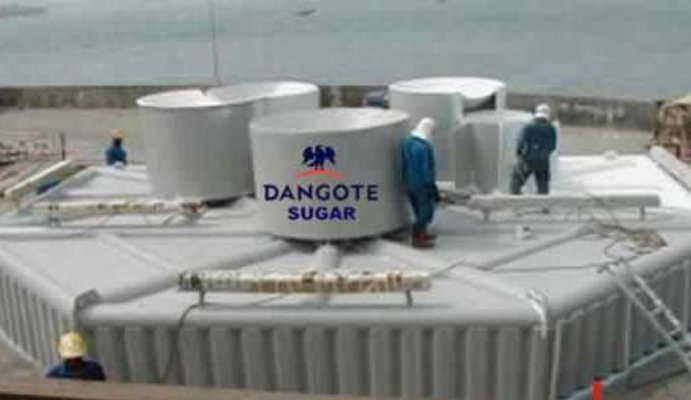The Agbada 2 flow station should have been buzzing with activity, pumping crude to one of Nigeria’s largest export terminals. Instead, it was idle in the muggy, mid-morning heat as Wilcox Emmanuel, the facility’s manager, shrugged in resignation about the thieves who’d shut him down.

The Agbada oil flow station, operated by Shell in Port Harcourt, Nigeria.
As much as 30 percent of the oil sent by pipelines through the swampy Niger River delta is stolen, consultant Wood Mackenzie Ltd. estimates. That’s depriving the country of income amid a crippling recession and compounding the pain of a global price slump for Africa’s largest producer.
At Agbada, the wells dotting the surrounding forests had been closed for three weeks following a pipeline leak that was probably deliberate. “Who knows when we’ll be back up?” Emmanuel said.
The 60,000-barrel-a-day flow station, owned by Royal Dutch Shell Plc’s Nigerian unit and idle for most of June, illustrates the nation’s struggle to restore deliveries of its most vital resource. Even after the government quelled a militant uprising that sent production to a 30-year low last August, smaller-scale sabotage caused by people trying to steal oil remains rife.
Companies are using surveillance helicopters equipped with infrared cameras every day. They’re also experimenting with drones and cages on wellheads rigged with alarms. But nothing seems to fix the problem.
“We’re trying all sorts of things, you wouldn’t believe it,” Igo Weli, a manager at Shell, said in Port Harcourt, Nigeria’s oil capital. “But how do you protect thousands of kilometers of pipelines against people who are out to sabotage them?”
While Nigeria’s output has risen more than 20 percent since August to almost 1.8 million barrels a day amid a fragile peace with militants, the continual disruption blighting the impoverished delta region threatens plans to top 2 million a day, according to Wood Mackenzie. Much of the stolen oil is processed in makeshift, illegal refineries, while more organized thieves load tankers for export.
“It’s constant,” said Gail Anderson, a WoodMac researcher in Edinburgh. “It’s a big amount of crude being stolen. Nigeria is selling much less oil on the international market than what is coming out of the ground.”
Damage caused by theft, in terms of lost output and pollution, can be just as severe as from the armed attacks and bombings by rebels, which last year knocked out terminals including Shell’s Forcados and Qua Iboe, run by Exxon Mobil Corp.
The leak on the pipeline taking Agbada’s crude to the Bonny export terminal in the Gulf of Guinea forced Shell to declare force majeure, a legal clause allowing it to miss deliveries. It also hurt production of gas, which flows out of the wells with the oil. Supplies to Nigeria’s liquefied natural gas plant at Bonny fell 10 percent during the outage, according to its head of production, Tayo Oginni.
The company where Oginni works, Nigeria LNG Ltd., has looked at gas transport options other than pipelines, given their vulnerability, but so far hasn’t found an affordable alternative, he said. Nigeria LNG is a joint venture between Shell, Total SA, Eni SpA and the state oil company.
Eni’s Nigerian subsidiary constantly patrols pipelines and wellheads and will typically shut them down upon spotting any vandalism, it said in a statement.
Catching thieves
Though the oil producers are stepping up surveillance, it’s an arduous task in an area the size of West Virginia where 5,000 wells nestle among swamps and creeks. When the companies see thieves at work, they have to rely on Nigeria’s military to catch them.
Better policing and government efforts to engage with communities have helped. In February, Vice President Yemi Osinbajo visited oil states, meeting representatives of militant and community groups and pledging to address grievances over poor infrastructure and a lack of jobs. The administration is desperate to ramp up production to revive growth in an economy that relies on oil and gas for almost all export earnings.
Though it’s a member of the Organization of Petroleum Exporting Countries, Nigeria was spared a production cap by the group last year as it worked to restore lost output. That exemption might not last if it can stabilize supply, fellow member Kuwait said this month. Nigeria may argue that persistent theft, estimated by think-tank Chatham House to take out 100,000 barrels a day — or almost $5 million at today’s prices — continues to hurt the industry.
$1 Billion cleanup
On top of that is the cost of clearing up the pollution from pipe ruptures. A 2011 UN study found that such an undertaking at Ogoni, just south of Port Harcourt, could exceed $1 billion and take 30 years. That’s helped spur the authorities to take action, according to Shell.
“The government is more awake,” Weli said. “It realizes how important this is — $1 billion spent cleaning up oil spills could go to schools or hospitals.”
President Muhammadu Buhari, like successive leaders before him, has vowed to stamp out assaults on oil infrastructure. But that will be hard as long as locals feel they benefit little from living in Africa’s most prolific oil patch — around half the Delta’s 33 million people survive on less than $2 a day. Last week, Shell again declared force majeure on Bonny exports because of a leak on another pipeline running to the terminal.
The region “has precious little to show for the oil it’s produced,” said Anderson of Wood Mackenzie. “Sabotage won’t go away until there’s some kind of economic and social transformation. It’s an ongoing battle.”
Courtesy Bloomberg










